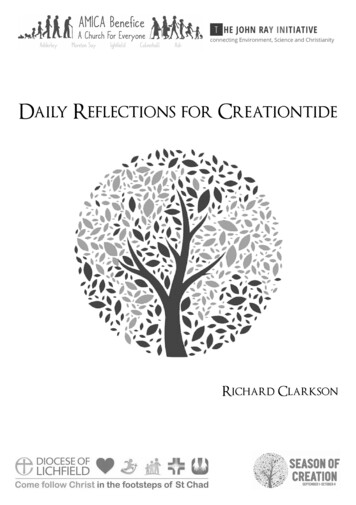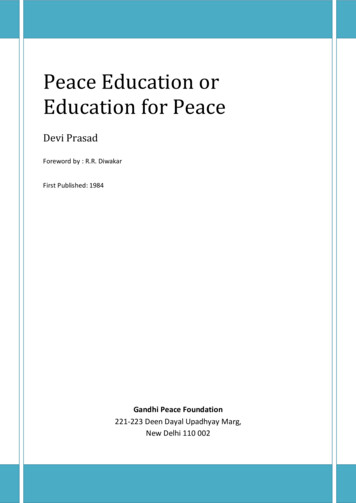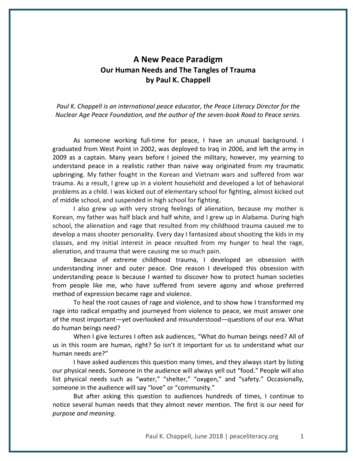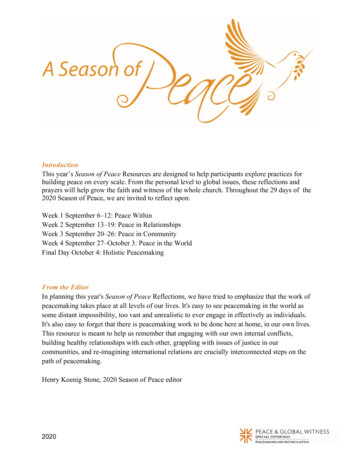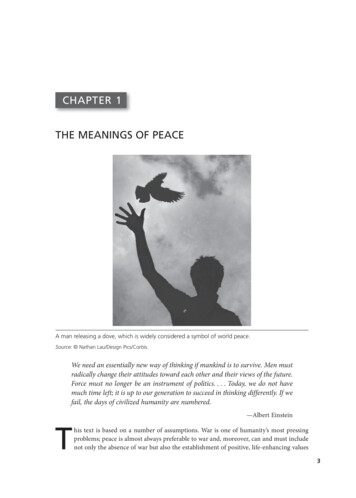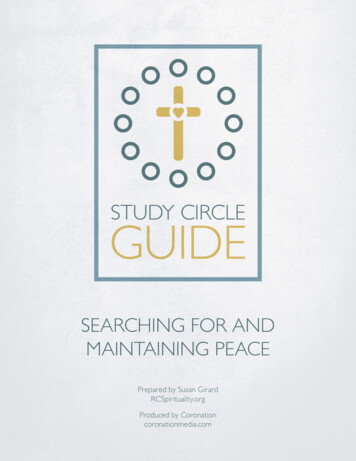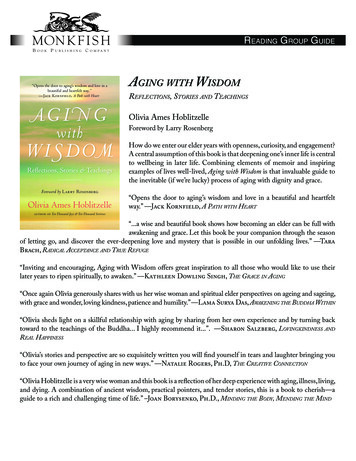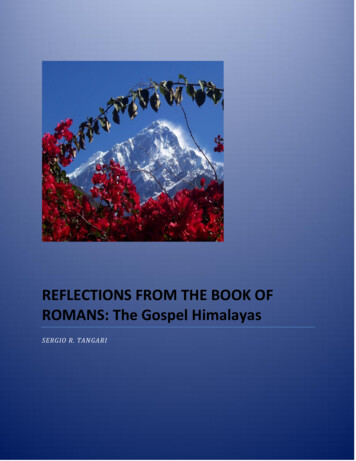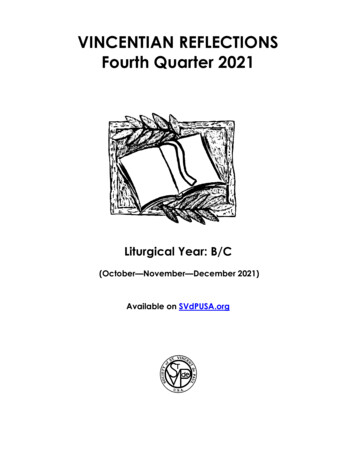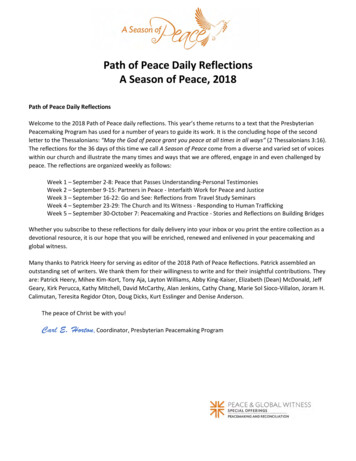
Transcription
Path of Peace Daily ReflectionsA Season of Peace, 2018Path of Peace Daily ReflectionsWelcome to the 2018 Path of Peace daily reflections. This year’s theme returns to a text that the PresbyterianPeacemaking Program has used for a number of years to guide its work. It is the concluding hope of the secondletter to the Thessalonians: “May the God of peace grant you peace at all times in all ways” (2 Thessalonians 3:16).The reflections for the 36 days of this time we call A Season of Peace come from a diverse and varied set of voiceswithin our church and illustrate the many times and ways that we are offered, engage in and even challenged bypeace. The reflections are organized weekly as follows:Week 1 – September 2-8: Peace that Passes Understanding-Personal TestimoniesWeek 2 – September 9-15: Partners in Peace - Interfaith Work for Peace and JusticeWeek 3 – September 16-22: Go and See: Reflections from Travel Study SeminarsWeek 4 – September 23-29: The Church and Its Witness - Responding to Human TraffickingWeek 5 – September 30-October 7: Peacemaking and Practice - Stories and Reflections on Building BridgesWhether you subscribe to these reflections for daily delivery into your inbox or you print the entire collection as adevotional resource, it is our hope that you will be enriched, renewed and enlivened in your peacemaking andglobal witness.Many thanks to Patrick Heery for serving as editor of the 2018 Path of Peace Reflections. Patrick assembled anoutstanding set of writers. We thank them for their willingness to write and for their insightful contributions. Theyare: Patrick Heery, Mihee Kim-Kort, Tony Aja, Layton Williams, Abby King-Kaiser, Elizabeth (Dean) McDonald, JeffGeary, Kirk Perucca, Kathy Mitchell, David McCarthy, Alan Jenkins, Cathy Chang, Marie Sol Sioco-Villalon, Joram H.Calimutan, Teresita Regidor Oton, Doug Dicks, Kurt Esslinger and Denise Anderson.The peace of Christ be with you!Carl E. Horton, Coordinator, Presbyterian Peacemaking Program
Sunday, September 2, 2018Peace that passes understandingBy Rev. Patrick D. HeeryPhilippians 4:4–9Rejoice in the Lord always; again I will say, Rejoice.Reflection: When Paul writes to the Philippians, he does so facing his own death. He is in prison, and not long fromnow he may be killed. In his letter, Paul reflects on his life and ministry, on all the things that we devote so muchenergy to, all the squabbles and arguments, all the fears and worries, and he says that none of it matters exceptthis one word: “Rejoice!”To rejoice, when the world gives you no reason to do so, is to defy the powers of this world and assertunequivocally that “the Lord is near.” It is to laugh in the face of the enemy. It is to declare, as Paul assertselsewhere, that nothing can separate us from the love of Jesus Christ. It is to be gentle when the world expectsharshness, to be honorable and just in a room that is anything but. It is to believe that there is something thatcannot be taken from us: we are the children of God. To know this, to revel in this, is to receive a peace that passesunderstanding.This week you’re going to hear about different kinds of peace that are so big, so complex, so counter-intuitive, thatthey transcend understanding. They are gifts. They are grace. They are Emmanuel: God among us.Action: Pray to God today. Pray as if God were right in front of you, as if God were breaking into this world as wespeak. What are you thankful for? What do you need help with? What places in your life and in this world cry outfor peace?Prayer: O God of peace, help us laugh more, rejoice louder, and sing more boldly. Let our joy defy—and remake—prison bars, and war, and bigotry, and all that would divide and wound your children. Let our joy combine withyours, and your Son’s, in remaking the world, till there is peace at last. Amen.Rev. Patrick D. Heery is the pastor of Westminster Presbyterian Church in Auburn, New York, and isthe former editor of Presbyterians Today and Unbound: An Interactive Journal of Christian SocialJustice.
Monday, September 3, 2018Peace that passes understanding: not one of usBy Rev. Mihee Kim-KortMark 9:38–50John said to him, “Teacher, we saw someone casting out demons in your name,and we tried to stop him, because he was not following us.”Reflection: I love when people ask me about my kids. People ask, “How old are they now?” and “How are theygetting along?” and invariably, “How are you still standing?” It’s a way to connect over something ordinary, human.It’s a way to feel that I am one of you.In Mark, John has the opposite in mind. He says, this man was not following us. He’s not like us. He’s not one of us.In an ABC “20/20” special, journalists showed children pictures of men of different races and then recorded theirreactions. When shown a photo of a black man and a white man, the children interpreted the black man as meanand criminal and the white man as nice and likely to be a teacher. The photo of the white man was of OklahomaCity bomber Timothy McVeigh; the black man pictured was Harvard University professor Roland Fryer.It starts early—all the biases, assumptions, judgments—it’s in the air we breathe. “They’re not part of us. They’renot one of us. They’re not us.”The gospel of Jesus, however, leads to a very different conclusion: not only is every person one of us, each is theliving representation of Christ. Instead of saying, “Teacher, we saw someone,” John should have said, “Teacher, wesaw you.” John should have seen Jesus in this stranger. And what about us? In the foreigner, the outsider, theminority, do we see God or just “someone”?Action: I keep hearing that protest chant—after the anniversary of Michael Brown’s killing—“This is what theologylooks like.” I see them standing huddled together, heads down, laying hands on each other like it’s an ordination, asthey shout #blacklivesmatter and #nojusticenopeace, anointed with sweat, tears, blood, and Spirit. I see them setapart for a holy work in which liturgy is wailing and protest. What should theology look like today?Prayer: O wonderful Christ, who became an outsider to save us, help us see you in every “someone” we encounter.And in loving them, help us become more like you. Amen.Rev. Mihee Kim-Kort is a Presbyterian minister, agitator, speaker, writer, and slinger of hopefulstories about faith and church. Her writing and commentary can be found at TIME., BBC WorldService, USA Today, Huffington Post, Christian Century, On Being, Sojourners, and Faith andLeadership. She is a religious studies PhD student at Indiana University.
Tuesday, September 4, 2018Peace that passes understanding: loving all of creationBy Rev. Dr. Antonio (Tony) AjaActs 2:1–13All were amazed and perplexed, saying to one another, “What does this mean?”But others sneered and said, “They are filled with new wine.”Reflection: However we understand this miracle, we know it is a miracle of full inclusion. The Holy Spirit comesupon the crowd, and no matter where they come from, each one of them is able to hear the words of hope in theirown language. However, there are still some in the crowd who doubt the power of God, make fun, and claim thatthose who speak other languages are “filled with new wine”—drunk, in other words.The renowned church historian Justo González gives us a plausible explanation. He writes that perhaps thesemockers could very well represent the privileged ones who expect to understand everything said because theirlanguage is the dominant language. They are at home, and so they expect everyone to speak their language and dothings their way. They represent the “norm” to which everyone else has to adapt. 1They think that their language—or way of thinking or acting—is better than everybody else’s.Action: As descendants of those multilingual disciples in Jerusalem, it is our duty to make sure that church andsociety accept, affirm, and celebrate our differences—advocating for the rights of everyone, no matter who theyare, what language they speak, or where they come from. Whom do you know who speaks a language other thanEnglish? Have you tried learning their language?Prayer: God of the diverse creation, we give you thanks for the colors, the sizes, the forms you created. Give us thecourage to accept everyone as they are, even if we are mocked by those who do not understand yourindiscriminate love for all of your creation. Amen.Rev. Dr. Antonio (Tony) Aja is a minister member of the Presbytery of Santa Fe and currently serves aspastor of Westminster Presbyterian Church in Santa Fe, New Mexico. He is the current moderator forthe Hispanic/Latinx National Presbyterian Caucus and an adjunct professor at McCormick TheologicalSeminary. A former refugee from Cuba, Tony has developed new ministries with refugees andimmigrants in Florida and Kentucky.1González, Justo, Acts, The Gospel of the Spirit, Orbis Books, 2001.
Wednesday, September 5, 2018Peace that passes understanding: a community that sharesBy Rev. Dr. Antonio (Tony) AjaActs 2:44–45All who believed were together and had all things in common; they would sell their possessionsand goods and distribute the proceeds to all, as any had need.Reflection: The thought of selling and distributing our possessions probably frightens us. We live in an individualisticsociety not that different from the Roman Empire. The first church in Jerusalem did something revolutionary forthen and now. They practiced koinonia, which besides “fellowship” also conveys “partnership” in the Greeklanguage. Scholars tell us that koinonia means that Christians are called to share their God-given resources witheach other and especially with the poor. It means that Christians are called to make sure that justice prevails, notonly within the church family, but also in society in general. Justice for all is the first requirement for people to livein peace.Action: Being in koinonia or partnership means that we take care of each other; that we are only as strong as ourweakest neighbor; that we must take responsibility for each other to make sure that no one goes hungry orhomeless or is discriminated against. We are all interdependent. Consider sharing your time and resources withsomeone else today. Maybe you will help refugees, or volunteer for Habitat for Humanity, or support Living Watersfor the World in bringing clean water to communities, or advocate on behalf of those who are marginalized.Prayer: Generous God, help us to understand that everything we have comes from you. Your child Jesus gave upeverything for us, including his life. Give us strength to follow his example as well as the example of the firstChristian community, so that we can all live in true koinonia. Amen.Rev. Dr. Antonio (Tony) Aja is a minister member of the Presbytery of Santa Fe and currently servesas pastor of Westminster Presbyterian Church in Santa Fe, New Mexico. He is the current moderatorfor the Hispanic/Latinx National Presbyterian Caucus and an adjunct professor at McCormickTheological Seminary. A former refugee from Cuba, Tony has developed new ministries withrefugees and immigrants in Florida and Kentucky.
Thursday, September 6, 2018Peace that passes understanding: sharing graceBy Rev. Layton E. WilliamsRomans 2:1–11Do you imagine, whoever you are, that when you judge those who do such thingsand yet do them yourself, you will escape the judgment of God?Reflection: In this season of peace, the Scriptures remind us of the dangers of judging others. “You mess up in thesame way sometimes,” Romans tells us, “so do you just not want God’s mercy and kindness, or what? Don’t yourealize that mercy is supposed to lead all of you to do better?”I admit that in these days, I find it hard not to judge. I see the horrific things people do in the name of security, ofself-righteousness, even in the name of my own God. I hear the awful words that people say to each other. Moredays than not, I have at least one moment when I want to give up on literally everyone. The idea that God offersgrace, forgiveness, and even patience toward everyone has me feeling like Jonah when God spares the Ninevites.Or like the Pharisee who prayed, “Thank you, God, for not making me like them” (Luke 18:11). But then I have toremember: I am like them. I say and do awful things out of anger and fear too.This passage reminds me (and us) that God has her own ways of bringing about justice through a framework ofgrace, even if I don’t understand it. And it reminds us that we benefit from that grace too whenever we mess up.Knowing this, let us seek to reflect God’s grace for this world that’s so hungry for it.Action: What do you catch yourself judging people for? In what ways do you also mess up even as you call outothers? What is one way that you can embody grace in the world on this day? Resolve to do at least one act ofgrace and love each day.Prayer: Holy God, help us to encounter the world through a framework of your grace. Help us to be humble in theways we fall short and patient with others when they fall short. Empower us to seek your justice and follow yourcall to abundant love. Amen.Rev. Layton E. Williams is an ordained PC(USA) teaching elder and writer, and currently serves asthe audience engagement editor for Sojourners in Washington, DC. She earned her M.Div. fromAustin Presbyterian Theological Seminary in Texas and previously served as pastoral resident atFourth Presbyterian Church in Chicago before entering the world of advocacy journalism. Shewrites primarily at the intersection of faith, justice, politics, and culture with a particularemphasis on sexuality and gender.
Friday, September 7, 2018Peace that passes understanding: a shared woundBy Rev. Patrick D. HeeryJohn 20:19–28Jesus came and stood among them and said, “Peace be with you.”Reflection: In the summer of 2017, I stood before 80 men incarcerated in a maximum security prison in central NewYork, during a revival called Alive in Christ Together. I told them how my twin sons, Ezra and Leo, had died just acouple months earlier, born too little to survive. As I spoke, I looked out on the faces of men who knew this painintimately. Some of them also had experienced stillbirths and miscarriages (the mortality rate for infants andmothers in the United States is appalling, but even more appalling is the racial disparity that renders black infantstwice as likely to die as white infants). Others had lost children to gun violence, addiction, poverty, policebrutality—or to the separation of incarceration. Almost all of them were themselves lost children, orphaned byeconomic and racial systems that had dehumanized and marginalized both them and their parents.The men began to cry with me. We held each other, shaking and praying—for their children, for mine, for thehundreds of thousands cradled in cultural memory. They wrote the names of my sons on artwork and stoles, whichthey gave me like sacraments. They told me the stories of their children; they lifted up names previously confinedto the silence of a prison cell.A peace that passes understanding took hold that day. Across the differences of our lives, we found each other in ashared dream—that these names would not be forgotten, that fatherhood could not be lost, and that the hope ofthe resurrection would prevail, in this world and the next.Action: Peace begins with a shared wound—like Jesus showing the holes in his side and saying, “Peace.” It beginswith the recognition that vulnerability is strength, and that pain spoken is a demand for justice. Tell someone yourpain today. See what it opens unto you and them.Prayer: Wounded God, show us your heartbreak, and hear ours. Make of us a beloved community that hurts,hopes, and stands up together. Amen.Rev. Patrick D. Heery is the pastor of Westminster Presbyterian Church in Auburn, New York, and isthe former editor of Presbyterians Today and Unbound: An Interactive Journal of Christian SocialJustice.
Saturday, September 8, 2018Peace that passes understanding: The Belhar ConfessionBy Rev. Patrick D. Heery, interviewing Rev. Allan BoesakMatthew 5:43–48“I tell you, love your enemies.”Reflection: I remember a conversation I once had with the South African pastor and anti-apartheid activist AllanBoesak. He taught me about peace—the kind that demands truth. The following is what he told me about ournewest confession: Belhar.“In 1986, when I looked around the synod voting on the confession, there was hardly a congregation or family thatdidn’t have someone in jail. Remember that the white Dutch church had never said a word about apartheid. Itscritique was aimed at us for protesting for the government. So why, with the blood on the street so fresh, wouldwe talk about unity with these people? Why would we talk about reconciliation? Because we asked ourselves,What does obedience to Jesus Christ mean in this situation? Shall we allow the harshness and horror of apartheid—and even its claim on Jesus Christ—to dictate to the church how we understand God’s word?“That is why we did not change a single word in Belhar, did not water it down or try to make people morecomfortable with it. Loving our enemy wasn’t about some easy harmony, as if that were even possible. It was abouta tough insistence on the demands of the gospel.“And that is the power of Belhar . . . We were turning the spiritual condition of forgiveness into a political reality ofconversion.“We had to begin by changing the whole idea of justice. Justice couldn’t be retribution or a turning of the tables.Justice meant helping restore the humanity of those who had dehumanized themselves by dehumanizing us.”Action: Whom in your life can you love today with a love so powerful that it reminds them of their own humanity?Love today in a way that demands and offers truth: the truth of who we are, and the truth of who we can become.Prayer: O merciful Savior, convert our hearts. Help us love more boldly. And make our love the power that changesthe world. Amen.Rev. Patrick D. Heery is the pastor of Westminster Presbyterian Church in Auburn, New York, and isthe former editor of Presbyterians Today and Unbound: An Interactive Journal of Christian SocialJustice.
Sunday, September 9, 2018Partners in peaceBy Rev. Patrick D. Heery1 Corinthians 13For now we see in a mirror, dimly, but then we will see face to face.Reflection: During my final year in college, I had the privilege of participating in community discussions that broughttogether people of many different faith backgrounds—Muslim, Jewish, Catholic, Unitarian, Quaker, Buddhist,Hindu, mainline Protestant, Evangelical. These talks were part of a university program called Difficult Dialogues,which invited divergent viewpoints on such topics as war, environmental justice, economics, sexuality, science, andreproductive choice.In contrast to the rancor and the rehearsed soundbites that dominate our public discourse today, it was moving towitness so many different people delving deeply into ideas that matter, unafraid to disagree, unafraid to challenge,but equally committed to maintaining the dignity and humanity of their interlocutors. Far from dividing us, theseconversations brought us closer. They led to shared meals in church basements, mosques, and community centers.Friendships were formed.Something powerful happens when we eat together, serve together, learn and discuss together, worship together.If peace begins with vulnerability, it takes root in relationship.This week you’re going to read about efforts to build peace between us while witnessing to peace in the widerworld.Action: Talk with someone today who’s different from you. Eat a meal together. Resist the labels and soundbitesthat quickly render us unable to see or hear the other. Talk about why you believe what you believe. You may notchange the other’s mind. But you will witness to the God of peace.Prayer: O magnificent God, you created such a diverse world full of such diverse people. As your servant Paul oncesaid, we see through a glass darkly. Help us find each other and, through each other, come to see you and yourworld a little more clearly. Let us work together for peace. Amen.Rev. Patrick D. Heery is the pastor of Westminster Presbyterian Church in Auburn, New York, and isthe former editor of Presbyterians Today and Unbound: An Interactive Journal of Christian SocialJustice.
Monday, September 10, 2018Partners in peace: breaking the rulesBy Rev. Abby King-KaiserLuke 6:6–11After looking around at all of them, Jesus said to him, “Stretch out your hand.”He did so, and his hand was restored.Reflection: We begin this week walking with Jesus on the Sabbath. He teaches, and is watched by those who are thereal teachers. He heals the man who needs it, despite the fact that he’s breaking the rules. He gets side-eyes,scoffs, and grumbles from the peanut gallery, who are now even more motivated to take down this guy who’sshaking up their world.All of this makes me wonder: How often have I not participated in God’s peace or justice because I was afraid Iwould break the rules? How many times have I asked myself: What will people think if I strap on my infant and goto an Occupy event? What will people think if my four-year-old is holding my hand at a Black Lives Matter rally?Perhaps I should be wondering what they will think if I am not doing these things.Working in ministry primarily with people of another faith means that I often have to reconsider the boundariesimposed by our society, even our theology. I was the advisor to the Muslim Student Association for four years; Iwork at a Jesuit University; and my first adjunct teaching gig was on a team with three Jewish men.Yet, in all those places, I have found not just rich learning, but also growth towards God. The 20 minutes of prayingalongside our Muslim students each week were often my most peaceful. And I wonder if breaking the rules was apart of what brought me peace.Action: Ask someone whose faith is different from your own what peace means to them. Ask: How does that growout of your values? What does reconciliation look like?Prayer: Lead me in your justice, O Lord, that I might worry less about the rules, and worry more about making yourbeloved community real. Amen.Rev. Abby King-Kaiser is a teaching elder, a mother of two, and a campus minister at XavierUniversity in Cincinnati, Ohio. She sees the world in pictures, which is most often translated viaInstagram even though painting is more fun.
Tuesday, September 11, 2018Partners in peace: confronting evilBy Rev. Abby King-KaiserPsalm 73When my soul was embittered, when I was pricked in heart,I was stupid and ignorant; I was like a brute beast toward you.Reflection: During the summer of 2001, after graduating from high school, I went on a study-abroad trip foreducators who teach about the Holocaust. Our leader was an elderly Christian man who had been arrested at 17and spent about six months in an SS prison for being part of the Dutch resistance rescuing Jews. I remember mosthis insistence that we look inward, over and over again, at our own evil.At the villa in Wannsee, where white, German, Christian men constructed the final genocidal solution for the Jewishcommunities of Europe, he made us look in the eye of those who attended the meeting. All along the way, hechallenged us to see the good and evil in absolutely everyone, regardless of their “side.”This psalm calls me to that same inward gaze.That fall, just three weeks into my first college semester, September 11 happened. Our campus ministry invitedfamilies of victims of 9/11 to campus to tell their stories. They told us about their opposition to the War on Terrorand their search for peace, even after so much pain.In seminary, I met a Sikh filmmaker almost my own age, who quit college to document the murderous violence hercommunity experienced after 9/11, starting that same week, because of the fear of her fellow Americans. It wasthen that I came face to face with the fact that, as an American, I was not only a victim, but also a perpetrator, ofterror.Action: Find a way to memorialize the victims of hate-based violence that followed 9/11 in addition to thethousands of victims of the terror attacks. Write down their names and pray for their loved ones. If you don’t knowwhere to start, begin with Balbir Singh Sodhi, murdered in Mesa, Arizona, on September 15, 2001.Prayer: God of mercy, accept our confession of all that we have done and not done. Turn our hearts inward tounderstand our own evil, that we might fully fight evil, terrorism, hate, and violence in all its forms. Amen.Rev. Abby King-Kaiser is a teaching elder, a mother of two, and a campus minister at XavierUniversity in Cincinnati, Ohio. She sees the world in pictures, which is most often translated viaInstagram even though painting is more fun.
Wednesday, September 12, 2018Partners in peace: mustard seedsBy Rev. Abby King-KaiserMatthew 17:14–21Then the disciples came to Jesus privately and said, “Why could we not cast it out?”Reflection: I know that I can be like the disciples, without even the small faith needed to heal, without even themustard seed. And yet, in the small things, that is where I can see peace building.When I was the advisor to the Muslim Students Association, I grew close to the officers. I spent a lot of time withthem, helping them to motivate and move their small but diverse cohort on campus. It was the best job—getting toknow students deeply, being challenged and stretched, and finding small ways I could be helpful. I enjoyed theirpresence and missed them when they were on breaks or graduated.So I felt particularly ashamed, when at a small open house at the very end of the semester, I blurted “Have a merryChristmas!” to the president of the MSA as we said goodbye. I could actually imagine stuffing my foot in my mouthor crawling under a rock to hide from the embarrassment. I apologized, profusely, but couldn’t undo theawkwardness in that moment.Almost four years later, when he was in the middle of law school and he could see the tide of Islamophobia risingaround him, he called me for advice and comfort. It was a pastoral conversation like many I have had with studentsor young alums, even though we didn’t share the same faith. We did share a lot of other things in common,however, and from there, while acknowledging and working with our differences, something took root.Maybe these are some of the mustard seeds I plant toward growing God’s peace. What are yours?Action: Plant something, literally. Choose to use one less disposable item today. Make a small financial contributionto a peacebuilding initiative. Find a way to plant a new mustard seed that is a part of God’s larger action towardpeace.Prayer: Creating God, draw us into this work and show us the small action we might take. Root us in a faith thattrusts your vision for peace. Amen.Rev. Abby King-Kaiser is a teaching elder, a mother of two, and a campus minister at XavierUniversity in Cincinnati, Ohio. She sees the world in pictures, which is most often translated viaInstagram even though painting is more fun.
Thursday, September 13, 2018Partners in peace: who is the real enemy?By Rev. Abby King-KaiserLuke 6:27–38“But I say to you that listen, Love your enemies.”Reflection: I find this passage a perennial challenge. As an American of a certain age—my generation’s firstpresidential election was decided by the Supreme Court; I was eighteen when the Twin Towers fell; and I was ingrad school when the bubble burst and the recession started—I have been told who my enemies are from an earlyage. As we grew, my generation found just as many enemies in places we thought we could trust—our electoralsystem, our economy, our banks, even the social media companies founded by those we went to college with.My senior year of high school in the Cincinnati area was marked by unrest and curfews following the death ofTimothy Thomas, unarmed in an alley, shot by police. His death came on the heels of many others, and I learnedabout my white privilege as I came to understand that my inherent trust of the police was a result of the racialcategory I was born into.Who is the enemy then? In many ways, it is us. In this passage, I hear Christ calling us to look at the people whomwe are told are the enemy. So very often, they are not, and the ones doing real damage look like friends and allies.If this is true, how might we go out of our way to build relationships across boundaries of race or religion orworldview?Action: Get out your cell phone. Look at the last 10 people you texted and called. Consider their identities. Do youshare race, culture, gender, religion, generation with the people on your list? Who is missing? Reflect on how youmight seek out communities different from your own to expand your social circles. Could you worship somewheredifferent this week? Attend an interfaith event? Try a festival you wouldn’t have gone to otherwise?Prayer: Compassionate God, draw us into your human family and remind us that we all belong to each other. Giveus eyes to see those enemies that you call us to love. Amen.Rev. Abby King-Kaiser is a teaching elder, a mother of two, and a campus minister at XavierUniversity in Cincinnati, Ohio. She sees the world in pictures, which is most often translated viaInstagram even though painting is more fun.
Friday, September 14, 2018Partners in peace: humilityBy Rev. Abby King-KaiserPhilippians 2:5–11And being found in human form, he humbled himself.Reflection: When I was a student, my campus minister was working to support the very new Muslim StudentsAssociation on our large, public campus. As a result, I became friends with a young woman who wore a hijab. Ourhigh school had had some religious diversity—I came from a very Catholic city that is also the birthplace of ReformJudaism. I had grown up next to a family who spoke Russian and put a menorah in their window when we got outthe Christmas lights. But I had never known
Path of Peace Daily Reflections . A Season of Peace, 2018 . Path of Peace Daily Reflections . Welcome to the 2018 Path of Peace daily reflections. This year’s theme returns to a text that the Presbyterian Peacemaking Program has used for a number of years t
